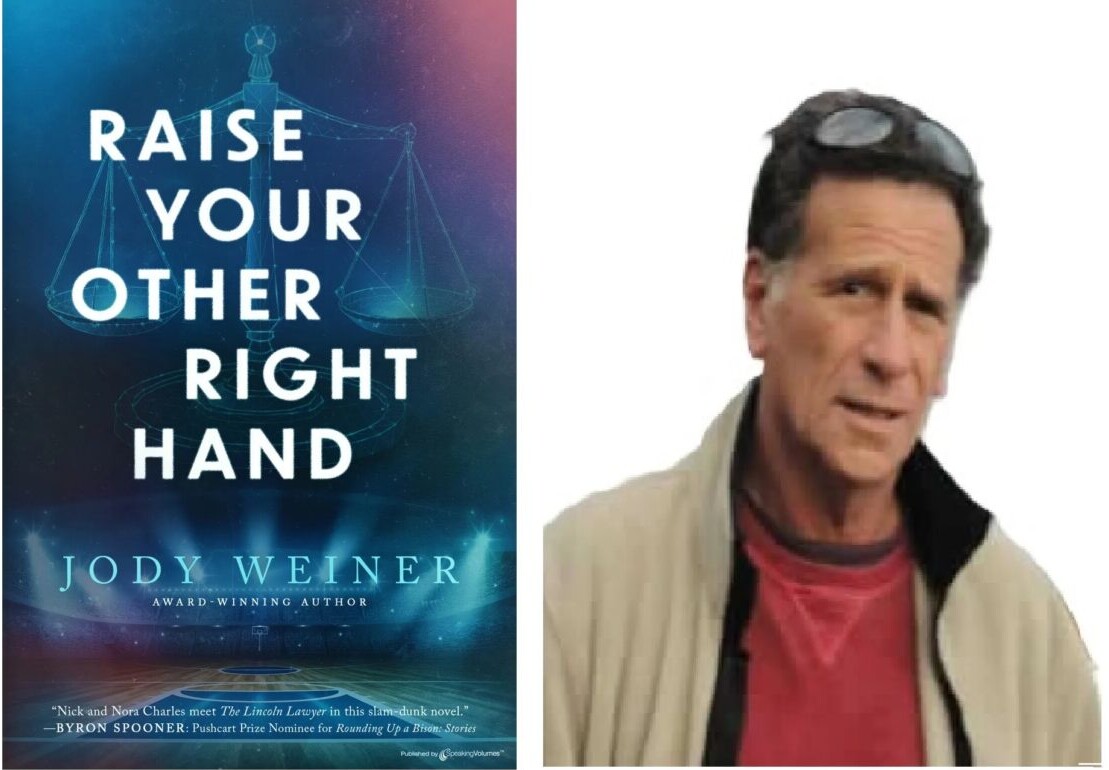“Raise Your Other Right Hand,” a story about athletics, mobsters and courtroom maneuvers, centers on a happy marriage and is driven by a steadfast belief in human decency. Local author and attorney Jody Weiner (“Prisoners of Truth”) delivers welcome and terrific uplift in these distressing times in the lively new novel.
Inspired by Dashiell Hammett’s “The Thin Man,” “Raise Your Other Right Hand” (Speaking Volumes, 232 pages, $16.95, March 11, 2025) is the first book in Weiner’s “Crime Therapy” series. A legal drama and marital comedy with a playful quality and just enough social content, it has breeze than heft in its less than 250 pages, but Weiner leaves the reader satisfied.
The setting is San Francisco in 2011, when the Arab Spring, Julian Assange, and the NBA lockout are making headlines.
Protagonist Archie Krafter, is, like Weiner, a Chicago-born attorney who has relocated to San Francisco and shifted from criminal to civil law. He is also a decent soul whose post-fast-lane life includes handling community-oriented cases, writing a current events blog and enjoying an affectionate relationship with his wife and confidant Lora, a musician and performer who runs a small theater.
Lora is the daughter of Sal Dellacozzi, a powerful organized-crime figure, whose world she wants no part of.
The two-pronged plot has Archie becoming mired in a pair of legal and ethical thickets.
In one arena, Archie gets involved in his first jury trial in years. The defendant is NBA superstar Radon Jaalaba, who plays for a Bay Area team called the Worriers (an appellation serving as an early indication that we shouldn’t take this book too seriously) and is secretly battling a drug addiction.
Radon who fled the scene of a double homicide that occurred while he was trying to score drugs, has been falsely charged with murder. The victims were a cop and Radon’s close friend Russell. The true nature of Radon’s relationship with Russell is the second potentially career-killing secret Russell harbors.
On front No. 2, Lora’s hapless brother Dominic faces criminal charges relating to an identity-theft scheme operated by the Dellacozzi crime family. Lora feels compelled to help her wrongly accused brother, and Archie reluctantly agrees to offer legal assistance.
As both Radon’s and Dominic’s storylines play out, Weiner keeps the action free-flowing and brisk. We get courthouse deal making; a Mafia birthday dinner (which Weiner accompanies with a comical family-tree-like chart); excursions into characters’ histories; moments of truth; and supporting characters who include Radon’s supportive mother; Sal’s consiglieri; a Croatian girlfriend; a formidable district attorney sometimes noted more for her physical appearance than her legal skills; and unscrupulous sports-world businessmen.
The latter include Bryan Marten, Radon’s manager and Archie’s consulting partner. Weiner uses the Bryan character to represent greedy aspects of San Francisco’s fractured ideological mindset. Archie, meanwhile, exemplifies old-fashioned San Francisco liberalism.
“Like livestock, his clients’ durability and consistency were valid above all else,” Weiner writes of Bryan’s attitude toward Radon and other athletes.
In contrast, Archie “had ego and earned a comfortable living. But he didn’t normalize ways to abuse his law license.”
A gripping thriller this novel isn’t. It doesn’t offer edge-of-your-seat suspense, and the characters are not in great danger.
But Weiner may not be aiming for such things. With storytelling acumen and knowledge, Weiner takes readers on an enjoyable, informative ride filled with astute observations, fun tidbits and enlightening facts about sports legends, Mafia notables, local luminaries, legal precedents and even courtroom design. Did you know that modern courthouses contain saloon-style doors, carried over from the days of Judge Roy Bean?
More seriously, the story addresses homophobia and physician malfeasance in professional sports, and, through excerpts from Archie’s blog, Weiner brings up issues relevant today such as freedom of information.
Determining whether WikiLeaks founder Julian Assange is a whistle-blowing hero or a dangerous traitor, Archie states that the nation needs him: “Assange may indeed be a bad actor according to our moral and legal standards. Nevertheless, lest we never forget, whoever controls the information controls the public mindset and, eventually, the soul of the people.”
Weiner avoids phony courtroom dramatics and big-bang climaxes, and when his characters choose the high road, and they often do in this feel-good story, there are no tidy bows at the end. We don’t feel we’re in fantasyland.
Weiner, who cites Louise Penny, Zadie Smith, Elizabeth Strout, Michael Connelly, and Hammett as authors he admires, describes his novel as “Kind of an homage to ‘The Thin Man,’” whose lovingly bantering Nick and Nora Charles are clearly inspiration for Archie and Lora.
Affectionate and intelligent, the Archie-Lora conversations, which involve everything from legal cases to a restaurant menu that seems “a little precious,” set an uplifting tone for the entire book.
Further enhancing the picture are song lyrics penned by Lora. A highlight is a composition called “Pro Bono Man,” inspired by Archie’s altruistic career turn.
Good news: Weiner has said that he’ll expand on the pair’s relationship in the second book in his “Crime Therapy” series, due next year.
Weiner appears at 6:30 p.m. April 16 in a launch party at City Lights, 261 Columbus Ave., San Francisco; at 3 p.m. May 4 at “How They Did It: Pivoting to Publishing at 50+” at 297 Page St., San Francisco; and 6 p.m. May 22 in “Dialogue: San Francisco Crime Writers” with Colman Conroy at the Main Library, sixth floor, 100 Larkin St., San Francisco.
The post Review: Fun, astute, San Francisco-set ‘Raise Your Other Right Hand’ pays homage to ‘Thin Man’ appeared first on Local News Matters.
